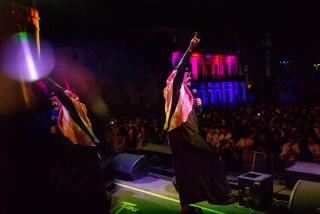Whirling Dervishes find a spin zone
- Share via
The French modern dance troupe Ballet Preljocaj took the stage at Royce Hall, UCLA, last weekend to explore a Westerner’s concept of transcending the ego. On Saturday, the Whirling Dervishes of Damascus with Sheikh Hamza Shakkur and the Al-Kindi Ensemble of Aleppo appeared at Royce to present a Sufi and classical Arab version of the same aspiration.
Part of the UCLA Live series, this program, presenting Sufi liturgy from the Great Ummayad Mosque of Damascus, straddled the problematic line between devotion and entertainment.
The four dervishes went into trance-induced spins -- lasting up to seven minutes -- and were roundly applauded for doing so. But wasn’t there something a little wacky in saying in effect, “Good job, there, fellows, in losing your egos”?
The ensemble was led by founder Julien Jalal Eddine Weiss, a French zither virtuoso who converted to Islam in 1986 when he realized that he could not penetrate any further into the meaning of Middle Eastern music without connecting to that faith.
Weiss has been criticized for sometimes addressing audiences to explain the intricacies of the music -- how each mode has its own ethos, color and sophisticated demands for placing of notes and intervals.
Some in the audience Saturday clearly were knowledgeable listeners. An occasional voice of encouragement arose, and mid-concert one man approached the stage and tossed singer-cantor Shakkur a note, the contents of which were not revealed. He read it, however, several times and looked pleased.
Other people just grooved on the music. Still others would have welcomed some information on the construction and intention of the various pieces, which, sometimes separated by applause, flowed one into another.
Weiss had a long, impressive solo filled with cascading arpeggios and intricately strummed and plucked passages. Other musicians had similar moments -- Ziyad Kadi Amin on the reed flute (ney) and Qadri Dalal on the lute (luth). Adel Shams El-Din was the important percussionist.
Cantor Shakkur was central to much of the music, launching into Arabic with chanted prayers for mercy and of adoration of God and the Prophet Muhammad.
Those who had come to see dance -- if a devotional ritual can be called dance -- had to wait awhile before seeing any. Indeed the 1-hour, 50-minute program was largely music. Altogether, there was maybe 20 minutes of whirling, divided into several short sections.
But it was certainly captivating. The dervishes, Hatem Al-Jamal, Maher Al-Jamal, Hicham Al-Khatib and Ahmad Al Khatib, spun in pairs, a trio and, only at the end, as a quartet. Their white robes flared out. Their arms extended up, out and down in fluent, separate patterns.
Their faces reflected deep concentration but were otherwise expressionless. Still, maybe it was a bit immodest for us to observe someone else’s bliss.
More to Read
The biggest entertainment stories
Get our big stories about Hollywood, film, television, music, arts, culture and more right in your inbox as soon as they publish.
You may occasionally receive promotional content from the Los Angeles Times.









